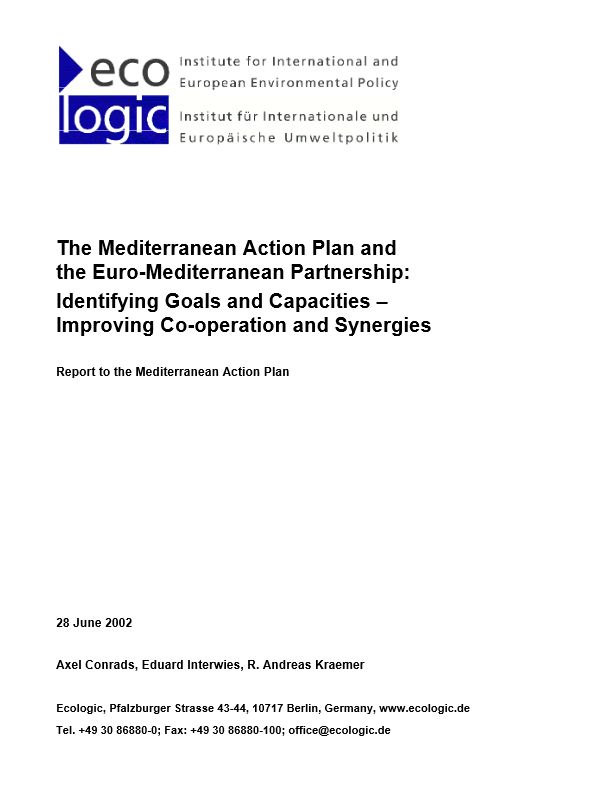The Mediterranean Action Plan and the Euro-Mediterranean Partnership: Identifying Goals and Capacities Improving Co-operation and Synergies
- Project
- Duration
-
-
With the project "The Mediterranean Action Plan and the Euro-Mediterranean Partnership: Identifying Goals and Capacities – Improving Co-operation and Synergies", Ecologic focuses on a series of institutional challenges and opportunities which the two major regional organisations in the Mediterranean basin are facing.
Since 1976 Mediterranean countries and the EU have been combatting environmental pollution and degradation in the Mediterranean region under the Mediterranean Action Plan (MAP). In response to the UNCED in Rio de Janeiro in 1992, the original pollutant-centred approach of MAP was converted into an integrative strategy of sustainable development which seeks to incorporate environmental policies and sustainability issues into sectoral socio-economic policies.
The Euro-Mediterranean Partnership (EUROMED), launched by EU and Mediterranean Foreign Ministers in 1975 and managed by the European Commission, envisions a threefold partnership in the fields of:
- security,
- economy and finance, and
- social, cultural and human affairs.
Emphasis is given to the second pillar, at the heart of which is the establishment of a free trade zone. In its basic document, the 'Barcelona Declaration', EUROMED also endorses environmental protection and the sustainable development of the region.
Both initiatives have therefore developed various activities related to the common goals of environmental protection and sustainable development; however, co-operation between the initiatives is still a rare occurrence.
The report focuses on the question of how to co-ordinate capacities in order to develop synergies with a view to the common goals. Options for co-operation identified refer to environmental and sustainability indicators: strengthening the MAP Priority Action Programme in Split with regard to its outstanding expertise in the field of integrated coastal zone management; joining activities on pollution from marine activities; merging the EUROMED Environmental Action Programme (SMAP) Correspondents and MAP National Focal Points; and building up MAP as a think tank supporting EUROMED policies with local and regional expertise. From an institutional perspective, the MAP Blue Plan in Sophia Antipolis is identified as highly qualified in the assessment of the impact of trade liberalisation, while the Mediterranean Commission for Sustainable Development is a widely-accepted body established between North and South in the framework of MAP. As such it could therefore develop a legitimate Mediterranean strategy on sustainable development and be a forum for debates on environmental and sustainability issues. Finally, establishing a joint MAP-EMP work process is considered to be an important institutional requirement for initiating co-operation.
The report "The Mediterranean Action Plan and the Euro-Mediterranean Partnership: Identifying Goals and Capacities - Improving Co-operation and Synergies" concludes that in order to achieve co-operation, MAP – while remaining an independent advisor in the field of environmental protection and sustainable development – would need to align its capacities and operations with EUROMED requirements, in particular with a view to funding project design. From a different perspective, the European Commission, following an independent evaluation of existing capacities in the MAP, should also explore capacity-building options within the MAP.
Here you can download the project report [pdf, 579 KB, English].
The main results of the report have been summarized in the Ecologic Brief "Joining Forces in the Mediterranean - Options for a Co-operation between MAP and EUROMED" that can be downloaded [pdf, 48 KB, English].







